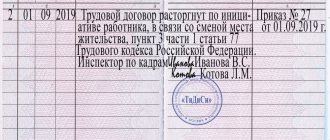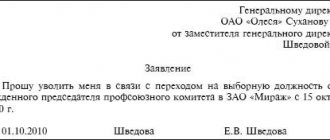The legislative framework
Article 81 of the Labor Code of the Russian Federation provides the reasons why an employer has the right to terminate an employment contract with an employee who has made a serious mistake in work.
However, the reason given there - the commission of guilty actions by an employee servicing monetary and inventory assets - deprives the organization of using this article to dismiss employees whose job responsibilities are not directly related to the receipt, storage, issuance of money or goods. Guilty actions are revealed only as a result of an audit of the financial and economic activities of the company, which means conducting an audit/inventory of goods and materials under the control of the employee and detecting their shortage or complete loss. In this case, according to Article 74 of the Labor Code of the Russian Federation, the employer has the right to apply disciplinary measures to the guilty person within 1 year after he committed an offense that resulted in partial or complete loss of entrusted property.
The above-mentioned article of the Labor Code of the Russian Federation also contains a list of guilty actions:
- theft of money, goods and materials, their loss or destruction;
- violation of cash accounting and cash transactions;
- fraud with money, goods, material assets;
- unjustified or fictitious write-off of inventory items;
- violation of the requirements of local regulations concerning the rules of reception, accounting, storage, issuance, and write-off of valuables.
The employer has the right to choose a disciplinary measure against the employee who committed such actions, and it is not necessary to fire the culprit. The decision is made depending on the specific situation, the severity of the offense, the seriousness of the consequences, as well as the personal qualities of the employee. It is permissible to limit oneself to a penalty, a reprimand in oral or written form, or deprivation of bonuses.
Trust, on the other hand, belongs to the category of personal value judgments, therefore the regulatory documents do not indicate exactly what actions of the guilty person can lead to its loss.
What does the law say?
Issues of termination of labor relations are considered by the Labor Code of Russia (LC). Dismissal can be made at the request of the employee or the will of the company management. The employer initiates the termination of the employment contract if a subordinate commits any violations or failure to fulfill official duties.
One of these reasons is loss of trust. This means that the employee committed a series of actions as a result of which he caused damage to property, the financial condition of the enterprise, etc. Provides for the dismissal of an employee due to loss of confidence in clause 7 of Article 81 of the Labor Code of the Russian Federation.
Termination of an employment relationship is possible if the following circumstances arise:
- provision by an employee of false or incomplete information about his income and expenses;
- failure by subordinates to take measures to prevent the development of a conflict situation;
- providing incomplete, inaccurate information about the property obligations of their loved ones.
Article 81 of the Labor Code of the Russian Federation allows dismissal due to lack of confidence only if there is evidence of the employee’s guilt. Illegal actions are identified during an audit of the company’s financial and economic activities.
For this purpose, an audit and inventory of inventory items (material assets) under the control of the employee is carried out. If a shortage or complete loss of goods and materials is detected, this will be grounds for loss of confidence on the part of the employer.
According to Article 192 of the Labor Code of Russia, company management may apply disciplinary measures to a guilty employee within a year.
Candidates for termination of employment contract
Management has the right to express distrust only to responsible employees. That is, for those who hold leadership positions or directly deal with servicing commodity or monetary values. For example, it is acceptable to no longer trust the honesty of an accountant or salesperson, but it is not acceptable to part ways with a locksmith or plumber for this reason.
And there are no subjective aspects in this - everything is clearly stated in clause 7, part 1, art. 81 Labor Code of the Russian Federation. But such employees cannot be fired for loss of trust in some situations. For example, severing an employment relationship with a pregnant woman (Article 261 of the Labor Code of the Russian Federation) or a minor employee (Article 269 of the Labor Code of the Russian Federation). True, it is still possible to fire a minor if he has committed theft; in addition, it is forbidden to enter into agreements with a minor on full financial responsibility. In addition, employees who are on vacation or sick leave have immunity, but only until their end.
Reasons for loss of trust
The reasons for the loss of trust in a subordinate on the part of the employer may be different. An employee is not always fired for committing guilty actions. Depending on the situation, you can limit yourself to a reprimand. But most often, company managers decide to terminate their employment relationship with the person responsible for the deterioration of the financial condition of the enterprise.
A civil servant is subject to dismissal due to loss of confidence in the event of:
- theft of money or inventory items, their deliberate destruction;
- bribery;
- violations of cash accounting;
- committing fraudulent transactions with finances, inventory items;
- violation of the requirements of local regulations that relate to the rules for receiving, recording and storing issued valuables;
- unjustified write-off of inventory items, etc.
The nuances of dismissal due to loss of confidence
Personnel officers need to remember that Article 81 of the Labor Code of the Russian Federation can be used as a basis for terminating an employment contract only if the following conditions are met:
- The employee’s job responsibilities include working with values;
- a liability agreement has been concluded with him;
- violations in the handling of money or property are documented;
- damage is expressed in a specific amount.
But even if these conditions are met, you cannot fire an employee for lack of trust:
- pregnant;
- a temporarily absent employee (you can deal with him only after he returns to work);
- a minor (unless there is a written consent of the labor inspectorate and the commission for minors).
Since termination of the contract on this basis is initiated by the employer, he will have to prove the employee’s guilt and determine whether there was intent in his actions. To do this, an inspection, audit, inventory, and internal investigation are initiated in relation to financially responsible persons. Based on their results, the cause of the committed offense is determined: ignorance of the rules for working with valuables, negligence, negligence, or deliberately causing damage to the employer.
If the employee’s guilt is not proven, dismissal for lack of confidence will be unfounded. For example, it is impossible to terminate an employment contract with a seller on the basis that he weighs and shortchanges buyers, unless this is confirmed by documents, for example, video filming in the sales area or written statements from buyers.
But this is not enough: facts indicating the employee’s dishonesty become only the basis for an inspection. And only its results, recorded in an audit or inventory act, will make the termination of the contract legal.
Employees subject to dismissal under article
Having thought about how the step-by-step procedure for dismissal is carried out due to loss of confidence in an employee, the owner of the company must remember that not every specialist can be forced to leave the company.
The article applies only to those officials who have access to the material assets of the company.
Suspension from work due to loss of confidence applies to:
- loaders who take goods from the warehouse without the knowledge of the owner and sell them on the side;
- security guards who allow unauthorized persons to enter the closed area;
- sellers selling alcoholic products after 22:00;
- workers who use issued tools to carry out repairs in their apartment;
- cashiers who cheat customers and use excess proceeds for their own purposes.
When faced with one of the above or similar cases, the employer has every right to apply the article and fire the specialist.
Who can't be fired
Which employee cannot be fired? The law prohibits the application of Article 81 of the Labor Code of the Russian Federation to personnel who do not interact with the material assets of the company. Thus, loss of trust cannot be a reason for dismissal:
- merchandising specialist who does not directly work with the company’s property;
- accounting specialist carrying out non-cash payments;
- an employee who divulged details of the work plan to a competing company;
- a person who is part of a group of workers who committed a guilty act, unless his personal guilt is proven.
- women expecting a child cannot be fired either.
Evidence and guilt
It must be borne in mind that management has the right to dismiss due to lack of confidence only if it has supporting documents that prove that this person directly serviced material assets. For example, the following documents: an employment contract and an agreement on financial liability (Article 244 of the Labor Code of the Russian Federation).
So, the employer has the right to begin the dismissal procedure if the person falls into the required category, and at the same time:
- takes or solicits a bribe;
- receives kickbacks;
- commits any actions that lead to the theft or loss of monetary and material assets, or the threat of such events;
- committed a criminal offense or illegal actions, not even related to his official duties (clause 45 of the Resolution of the Plenum of the Supreme Court of the Russian Federation dated March 17, 2004 No. 2.
Information about civil servants who have committed corruption offenses and were dismissed under the article “loss of trust” is entered into the register, which is posted on the Internet in the public domain (Article 15 of the Federal Law of December 25, 2008 N 273-FZ “On Combating Corruption”).
Let's consider the procedure for dismissal due to loss of trust and how to formalize this without violating the law.
We invite you to familiarize yourself with the One-time payment upon dismissal of a civil servant
find_in_page Related Articles
(click to open)
- Dismissal under article for failure to fulfill official duties: instructions and legal obligations
- How to quit if the dismissal date falls on a weekend or holiday: rules, unique situations, calculation
- The procedure for dismissal under an article for drunkenness: what threatens such a violation of discipline, step-by-step instructions for dismissal, sample documents
- The procedure for dismissal due to staff or headcount reduction
- How is compensation made for unused vacation upon dismissal?
- Forced dismissal: what threatens both parties and how to respond to it
- Unlawful dismissal: how an employee can deal with it
- Article 77 of the Labor Code upon dismissal: features and grounds for termination of an employment contract
- Dismissal from a company by transfer: what employees and employers need to know
- Article 33 of the Labor Code upon dismissal
- Dismissal of a disabled person: procedure for the employer and features of drawing up documents
- Dismissal of a pregnant woman under a fixed-term employment contract
- Order of dismissal for absenteeism: procedure for execution and sample of filling out the order with explanations
- Features of receiving compensation for unused vacation without dismissal and the procedure for calculating it
- Dismissal for health reasons: is it possible, procedure for registration
- How to count 2 weeks upon dismissal with service: the day the work begins, taking into account weekends and holidays
- Certificates upon dismissal of an employee in 2020, documents
- How to calculate average daily earnings
- What to do if the employer does not sign the resignation letter
- Termination of an employment contract at the initiative of the employee, procedure, terms, grounds for challenging in court
- Features of the dismissal procedure in case of bankruptcy of an enterprise
- What to do if you are not paid your salary upon dismissal and where to go
- Work off upon dismissal: is work work required, in what cases can you not work for 2 weeks?
- Dismissal of the general director of an LLC at his own request or on the initiative of the founder
- Dismissal of pre-retirement age - Labor Code of 2019: liability at the initiative of the employer
- Dismissal due to the death of an employee: sample order, date and wording, payments to relatives
- Issuance of a work book upon dismissal according to the Labor Code of the Russian Federation
- Dismissal under a fixed-term employment contract: procedure and features of the procedure, working period
- What certificates must an employer issue when dismissing an employee in 2020?
- Dismissal of the chief accountant, reasons, documents, transfer of affairs
- Bypass sheet upon dismissal: is it legal, sample, mandatory or not
- Articles of dismissal from work under the Labor Code of the Russian Federation - 77, 79, 80, 178 article of the Labor Code
- Severance pay upon dismissal, in what cases it is due, calculation formulas depending on the method of dismissal
- How to fire an employee, rules and procedure for dismissal from work, step-by-step instructions, sample documents
- Compensation upon dismissal by agreement of the parties
- Dismissal - entry in the work book, sample 2020
- How to fire a part-time worker at the initiative of the employer
- Calculation upon dismissal: payment terms, calculation, calculator
- Termination of an employment contract at the initiative of the employer, Article 81 of the Labor Code of the Russian Federation
- Can a pregnant woman be fired from her job?
- Instructions for deduction for unworked vacation days upon dismissal from an employee
- Dismissal during vacation at your own request
- Is it possible to quit without working for two weeks, how to write a letter of resignation at your own request
- Application for leave followed by dismissal
- How to competently quit your job: at your own request, by agreement of the parties, or on the initiative of the employer
- Compensation upon dismissal - what payments are due?
- Dismissal while on sick leave
- Resign by agreement of the parties - how to terminate by agreement
- Under what article are people fired at their own request?
- The day of dismissal is considered a working day or not
- Order of dismissal
- Dismissal under an article: why they can be fired
- How to write a resignation letter of your own free will
- Dismissal for absenteeism
- Dismissal during probationary period
- Probationary period when hiring: its duration, sample employment contract
- The procedure for dismissal at will: rights and obligations of the employee and the employer, entry into the labor record
- Can a pregnant employee be fired during a probationary period?
- Continuous service after voluntary dismissal
- Dismissal of a pensioner
- Dismissal of a financially responsible person at his own request
- How can the general director of an LLC resign at his own request and not end up in court?
- Withdrawing a resignation letter at your own request
- Sick leave pay after dismissal
- How an employee is laid off from an enterprise in 2019
- Dismissal of employees due to the liquidation of an enterprise in 2019: procedure, payments, challenges
- Dismissal due to staff reduction: payments and compensations
HR specialists who have encountered the dismissal procedure at the initiative of the employer know that in this case it is necessary to scrupulously adhere to legal norms and record all their actions in writing.
If any employee is suspected of abusing entrusted assets, dismissal may be initiated under the article “Loss of trust.” Then you need to follow the following algorithm:
- The employee who discovers the violation draws up a report addressed to the manager, describing the circumstances of the case and indicating what valuables were allegedly lost.
- To determine the amount of damage caused, a special commission of at least three people is established. The fact of creating a commission is formalized by a production order.
- The commission is conducting an internal investigation. If necessary, the head of the company can contact law enforcement agencies to establish all the circumstances of the case.
- Based on the results of the inspection, an act is drawn up, which records the nature of the violation, the list of perpetrators, and the amount of damage caused.
- The employee is introduced to the act: the text is read out in the presence of two independent witnesses. The culprit is then asked to sign a document. If he refuses, a corresponding entry is made about this.
- To impose a penalty, an explanatory note is required from the employee, in which he must state the reasons for the offense (Article 193 of the Labor Code of the Russian Federation). The requirement to provide explanations is made in writing. If explanations are not provided within two days, this fact is also recorded in the report.
We invite you to familiarize yourself with Work and vacancies in Italy for girls and women in 2020
If the documents listed above are available (even without an explanatory note), dismissal for loss of trust is quite legal. If the employer makes the appropriate decision, the contract with the culprit is terminated according to the general procedure:
- a dismissal order is drawn up;
- a calculation note is being prepared;
- the issue of the procedure for compensation for damage will be resolved;
- the corresponding entries are made in the work book and personal card.
An employer who dismisses an employee under Article 81 of the Labor Code of the Russian Federation must scrupulously comply with all legal requirements on this issue in order to not give the offended person an unnecessary reason to go to court and demand reinstatement.
Step-by-step procedure
Termination of employment relations with an employee due to loss of trust in him has its own characteristics.
It is important to know them and follow the algorithm of actions in order to carry out the procedure within the framework of the law. This will save the employer from problems from regulatory authorities. Dismissal due to loss of trust is carried out according to the following instructions:
- detection and recording of grounds for termination of employment relationships;
- conducting an official investigation;
- receiving an explanatory note from a subordinate;
- drawing up a report on the results of the investigation;
- issuing an order and familiarizing the employee with it;
- making an entry in the work book.
Detection and recording of grounds for dismissal
Loss of trust as a basis for dismissal of an official must be proven and documented. If it is discovered that a subordinate has committed a guilty act, it is required to draw up a memo about the detected misconduct.
The document is drawn up in free form; when writing it, you must adhere to the standard structure and rules:
- in the upper left corner of the sheet the full name and structural unit of the employee who learned about the offense is indicated;
- in the left-right corner is written the full name and position of the addressee;
- just below in the center is the name of the document: report or memo;
- under the title the date and place of drawing up of the paper is indicated;
- the main part of the document provides detailed information about the identified guilty act;
- At the end there is a signature with a transcript.
If the document is drawn up correctly, it will be the basis of evidence for dismissing a subordinate.
Conducting an internal investigation
The employer creates a special commission to conduct an internal investigation.
It consists of at least three people and is approved by order. The order provides the purpose and date of creation of such a group, its powers, full names of members, and period of activity. The commission establishes the fact that the subordinate has committed guilty actions. It determines the place, time, method, and cost of damage.
Identifies the specific culprit, collects and stores investigation materials.
Written explanation from an employee
The recorded fact of committing a guilty act requires an explanation from the employee. For this purpose, the subordinate is sent a request to provide an explanatory note.
The employee must complete such a document within two days and submit it to management for review.
The explanatory note is drawn up in free form.
It describes all the circumstances that led to damage or loss of company property. If there are supporting documents, they should be attached to the note.
If the violation was caused by a valid reason, the charge against the employee will be dropped.
Drawing up a report on the results of the investigation
Based on the results of the investigation, a report is drawn up. It is drawn up in any form, since there is no unified form. The document contains information about the results and conclusions about the guilt of a particular person, proposals for punishment. The act is signed by all members of the commission.
Rules for registration and sample order
Based on the results of the inspection, the head of the company issues an order to dismiss the subordinate. The order is issued on form T-8.
https://youtu.be/tifwWfg5lFg
A reference to the seventh paragraph of Article 81 of the Labor Code of Russia is required. All documents drawn up during the investigation (memo, commission act, employee’s explanatory note) are listed as grounds for termination of employment relations.
Also, the head of the enterprise can issue an order in free form or on company letterhead. In this case, you need to follow the standards of office work.
The order should include the following information:
- organizational and legal form, company name, OKPO code;
- name and number of the document, place and date of its preparation;
- Full name, structural unit and position of the employee;
- grounds for issuing the order;
- link to the Labor Code of the Russian Federation;
- the reason for termination of the employment relationship;
- date of dismissal;
- details of a previously concluded employment contract;
- instructions to employees of the personnel and accounting departments regarding the execution of the order;
- signatures of the persons mentioned in the decryption order.
A sample order of dismissal for lack of confidence is available.
Dismissal algorithm
Article 192 of the Labor Code of the Russian Federation provides for a number of disciplinary sanctions that the employer has the right to apply to employees if they violate the terms of the employment contract, do not comply with discipline or ignore job responsibilities. And if trust is lost, dismissal is one of these disciplinary measures.
Therefore, it is necessary to strictly follow the procedure for dismissal due to loss of trust. The algorithm of actions is as follows:
- Upon receipt of information about guilty actions, for example, in the form of an internal memo, the head of the organization creates a special commission to conduct an internal investigation.
- Members of this commission study all the circumstances, conduct an inventory of money, goods or documents entrusted to the employee. In the case of an accountant, an audit is sometimes required.
- Next, the employee whose activities are being investigated must provide the commission with written explanations. He has two working days to do this from the moment he receives a written request from management. The employee has the right to refuse explanations; in this case, his refusal is formalized in an act. Refusal to provide explanations does not prevent dismissal.
- After the investigation is completed, its results are formalized in an act or conclusion. In this document, members of the commission must inform management of the results of the investigation, conclusions about the reasons for what happened and the punishment of the perpetrator (provided that his guilt is proven). The act must be signed by the chairman and members of the commission.
- The head of the organization agrees (or disagrees) with the conclusions and proposals of the commission (assuming he agrees) and issues an order of dismissal due to loss of trust with the corresponding entry being made in the employee’s work book. The order must be reviewed and signed within 3 days. In case of refusal, it is necessary to draw up a report on this.
- The payroll and work book must be handed over on the day of dismissal.
Sample order
Please note that if we are not talking about a violation at work, then this algorithm may not be used. If a responsible employee was, for example, convicted of a criminal offense or even simply brought to justice, management has the right to dismiss him only on this basis, without asking for an explanation and without creating a commission to investigate (see paragraph 2 of paragraph 45 of the Resolution of the Plenum of the Supreme Court of the Russian Federation dated 03/17/2004 No. 2).
Dismissal due to loss of confidence
One of the grounds on which an employer can terminate an employment contract with an employee on his own initiative is the loss of confidence in this employee (clause 7, part 1, article 81 of the Labor Code of the Russian Federation). In this article, we will tell you who can be fired for loss of trust, and also provide the procedure for dismissal due to loss of trust.
Dismissal due to loss of confidence: who exactly can be fired on this basis
Dismissal due to lack of trust threatens only employees servicing monetary or commodity assets in cases where these employees commit guilty actions, as a result of which the employer has reason to no longer trust these employees (Clause 7, Part 1, Article 81 of the Labor Code of the Russian Federation).
Who cannot be fired due to loss of trust
If guilty actions were committed by an employee servicing monetary/material assets, but she is pregnant, then the employer cannot fire her (Article 261 of the Labor Code of the Russian Federation).
In addition, due to loss of trust, it is impossible to dismiss an employee who is on sick leave or on vacation (Article 81 of the Labor Code of the Russian Federation). He can be fired after returning to work.
Also, the dismissal of minor workers is prohibited if there is no consent to these actions from the labor inspectorate and the commission on affairs of minors and the protection of their rights (Article 269 of the Labor Code of the Russian Federation).
What document confirms that the employee served cash/commodity assets?
Such a document can be an employment contract or an agreement on financial liability (Article 244 of the Labor Code of the Russian Federation).
What guilty actions of an employee may lead to a loss of trust on the part of the employer?
Unfortunately, labor legislation does not explain what specific guilty actions of an employee can lead to the employer losing confidence in him. But such actions, for example, include:
- actions that resulted in theft or loss of monetary and material assets, or a threat of theft/loss;
- bribery.
It is worth noting that the employer has every reason to lose confidence in his employee, even if his guilty actions are not related to work (Article 81 of the Labor Code of the Russian Federation, paragraph 45 of the Resolution of the Plenum of the Supreme Court of the Russian Federation of March 17, 2004 N 2).
Dismissal due to loss of trust: procedure
If the employee’s guilty actions are directly related to the performance of his official duties, then dismissal due to loss of confidence is a disciplinary sanction (Article 192 of the Labor Code of the Russian Federation). And the Labor Code establishes a clear procedure for applying disciplinary sanctions (Article 193 of the Labor Code of the Russian Federation).
Dismissal due to loss of trust: employer actions
To dismiss an employee on this basis, it is necessary to prove that the employee actually committed guilty actions, as a result of which he lost the trust of his employer. Accordingly, if an employer decides not to contact the police, it must conduct its own investigation.
To conduct such an investigation, a special commission is created, and the basis for its conduct may be, for example, an internal memo from the immediate superior of the offending employee.
Let us note that if during the investigation it is necessary to carry out an inventory (for example, to confirm the fact of a shortage/theft), then before carrying it out, be sure to take a receipt from the employee stating that all monetary and material assets entrusted to him have been capitalized, and those that have been disposed of, - written off.
Conducting an investigation: requesting explanations
During the investigation, the employer needs to request a written explanation from the employee, to submit which the employee has two working days (Article 193 of the Labor Code of the Russian Federation). It makes sense to put this requirement in writing. For example, like this:
Storekeeper of Silk Road LLC Epifanov I.I.
Request for explanations
In accordance with Art. 193 of the Labor Code of the Russian Federation, I ask you to provide, within two working days from the date of receipt of this Requirement, an explanation regarding the fact of a shortage of silk fabric (art. No. 12345) in the warehouse in the amount of two rolls. These explanations must be submitted to the chief accountant L.K. Smetanina.
General Director of Silk Road LLC __Shelkopryadov___ G.S. Silkworms 11/21/2016
One copy of the request was received by: __________ ____________ I.I. Epifanov date signature
If the employee does not provide an explanation within the allotted time, then it is better to record this fact. For example, like this:
General Director of Silk Road LLC G.S. Shelkopryadov from chief accountant L.K. Smetanina
I, the chief accountant of Silk Road LLC, L.K. Smetanina, have drawn up the following act. December 5, 2020 from the storekeeper to Epifanov I.I. written explanations were requested regarding the shortage, which he had to submit within two working days. However, until now Epifanov I.I. did not provide the necessary explanations.
Chief accountant Smetanina L.K. Smetanina 11/24/2016
By the way, an employee’s ignoring the requirement to provide an explanation is not an obstacle to dismissal due to loss of confidence (Article 193 of the Labor Code of the Russian Federation).
Registration of investigation results
Record the results of the investigation in the appropriate act. There is no unified form for such an act, so its form is developed by the employer independently.
In addition to the results of the investigation, this act, as a rule, contains the commission’s proposal on the measure of punishment for the employee (of course, provided that his guilt is proven).
The act is signed by the members of the commission and its chairman.
If the employee committed the offense outside of work
In the case where the employer has lost confidence in the employee due to the latter’s actions not directly related to work, there is no need to conduct an investigation and take explanations from the employee.
But in order, if necessary, to confirm the validity of dismissal due to loss of trust, obtain documents that will make it clear why you no longer trust your employee (for example, a court decision to bring the employee to criminal liability).
Order of dismissal due to loss of confidence
If, after considering the results of the investigation or other materials, the head of the organization/individual entrepreneur decides to dismiss the offending employee, then a dismissal order is issued (Article 84.1 of the Labor Code of the Russian Federation).
The employee must be familiarized with this order against signature within three working days from the date of its publication (Article 193 of the Labor Code of the Russian Federation). If the employee refuses to sign the order, the employer must draw up a corresponding act.
You can find a sample order of dismissal due to loss of trust in our material.
A certain period of time is allotted for dismissal due to loss of confidence in the employer.
Thus, to dismiss an employee due to loss of trust, the employer must:
- no later than 1 month from the date of discovery of the offense. Moreover, the time the employee is sick or on vacation is not included in this period;
- no later than 6 months from the moment the offense was committed. If guilty actions are revealed during an inspection/audit - no later than two years from the date of commission of these actions.
If an employee committed an offense that led to a loss of trust on the part of the employer, not at the place of work or at work, but not in connection with the performance of his job duties, then the employee can be dismissed no later than one year from the day the employer learned about this offense (Article 81 of the Labor Code of the Russian Federation).
Dismissal due to loss of confidence: entry in the work book
When dismissing an employee, the employer must make an appropriate entry in the employee’s work book:
| Entry no. | date | Information about hiring, transfer to another permanent job, qualifications, dismissal (indicating reasons and reference to the article, clause of the law) | Name, date and number of the document on the basis of which the entry was made | ||
| number | month | year | |||
| 1 | 2 | 3 | 4 | ||
| Limited Liability Company "Silk Road" (Silk Road LLC) | |||||
| 9 | 15 | 09 | 2015 | Hired as a storekeeper | Order No. 27/p dated September 15, 2015 |
| 10 | 14 | 12 | 2016 | Dismissed for committing guilty actions giving grounds for loss of trust on the part of the employer, clause 7 of part 1 of article 81 of the Labor Code of the Russian Federation | Order No. 29/у dated December 14, 2016 |
| Specialist Krylova S.L. Krylova | |||||
| Epifanov | |||||
Let us remind you that from November 27, 2016, an entry about dismissal in the work book is certified by the employer’s seal only if it is present (Order of the Ministry of Labor dated October 31, 2016 No. 589n, Order of the Ministry of Labor dated October 31, 2016 No. 588n).
After making an entry in the work book, do not forget to make a similar entry in the employee’s personal card (form T-2, approved by Resolution of the State Statistics Committee of the Russian Federation dated January 5, 2004 N 1).
The employee must sign the work book and his personal card.
Payments upon dismissal due to loss of confidence
An employee who is dismissed due to loss of confidence is entitled to the same payments as any other resigning employee, i.e. he needs to be paid wages, compensation for unused vacation, etc. (Article 140 of the Labor Code of the Russian Federation).
Moreover, if the employee caused material damage to the employer and the employer accepted an order to compensate for the damage no later than a month from the moment its amount was established, then the amount of damage (if it does not exceed the employee’s average monthly earnings) can be withheld from dismissal payments (Article 248 of the Labor Code of the Russian Federation).
What does an employer face in case of illegal dismissal due to loss of trust?
If an employer dismisses, for example, an employee who does not service monetary/commodity assets on this basis, and this employee goes to court with a claim for illegal dismissal, then most likely the court will oblige the employer to reinstate this employee. In addition, the employer will have to (Articles 237, 394 of the Labor Code of the Russian Federation):
- pay the employee for forced absence according to average earnings;
- compensate for moral damage caused to this employee.
By the way, if an employee complains about illegal dismissal to the labor inspectorate, the employer faces a fine in the amount (part 1 of article 5.27 of the Code of Administrative Offenses of the Russian Federation):
- from 30,000 to 50,000 rub. – for the organization;
- from 1000 to 5000 rub. – for officials of organizations. A fine of the same amount is provided for the individual entrepreneur.
Procedure for the employer
Termination of an employment contract under clause 7, part 1, art. 81 of the Labor Code of the Russian Federation should occur according to the algorithm given below.
Free legal consultation We will answer your question in 5 minutes!
The employee is sent notice of dismissal, although after an internal investigation it is unlikely to be unexpected for the addressee. It is advisable to obtain the employee’s signature indicating that he has read the document. If the employee does not consider himself guilty, he may well refuse to sign the notice, or he may simply be absent from the workplace. Then the document is sent by registered mail with notification.
Free legal consultation
We will answer your question in 5 minutes!
It is recommended to dismiss the employee without two weeks of service, since the fact that he was allowed to perform official duties refutes the conclusions of the commission. Then it turns out that the employee is innocent, dismissal due to lack of confidence is unreasonable, therefore, the corresponding article of the Labor Code of the Russian Federation cannot be applied.
The document is drawn up in form T-8, it contains a reference to the corresponding article of the Labor Code of the Russian Federation. The order signed by the manager is given to the employee for review. If the corresponding signature is not received within three working days, an act of refusal to become familiar with the contents of the document is drawn up. Members of a previously created commission can sign it.
Payment to the employee
Despite dismissal for “bad” reasons, the employer is obliged to pay the employee all amounts due, including wages for time worked and compensation for unused vacation. There is no need to pay bonuses, since the employee was convicted of dishonest performance of duties.
If dismissal occurs due to loss of trust, the employer independently determines the procedure for compensating for damages. If the losses are small, they can be repaid from the earnings of the perpetrator (no more than 20% of the payment amount). The person being dismissed can compensate the rest voluntarily by depositing money into the company's cash desk.
We invite you to read Dismissal of a part-time worker: notification of how to fire a part-time worker
All money must be paid on the last working day, even if the damage caused by the dismissed person is not covered. Delay in payments is fraught with sanctions for the employer.
Package of documents
No matter how the company parted with the employee, it is impossible to violate the requirements of the law. Therefore, on the day of dismissal he must receive:
- certificate 2-NDFL;
- certificates of personalized accounting and the amount of insurance premiums paid;
- copies of hiring and dismissal orders, acts drawn up in relation to the employee (upon written application);
- certificate of average monthly salary for the last three months;
- work book.
The employer has three days to complete and issue documents, and copies must be certified by the signature of the manager and the company’s seal in the generally established manner.
The basis for making an entry, as in all other cases, is an order. The work book records the basis for termination of the contract - dismissal for loss of confidence, indicates the relevant article of the Labor Code of the Russian Federation, and makes reference to clause 7, part 1.
Filling procedure:
- column one – serial number of the record;
- column two – date of termination of the contract;
- column three – reason for dismissal, exactly repeating the wording of the order4
- Column four – details of the order.
The entry is certified by the signature of the manager or an authorized person, then a stamp (if any) and the employee’s signature are affixed to the work book. Obtaining the latter will be problematic if the fired person does not show up for the document.
Dismissal period
For disciplinary offenses that caused these extreme measures, certain statutes of limitations are provided:
- 1 month from the date of discovery of the offense;
- 6 months from the date of commission of the offense, not counting the time of criminal proceedings;
- in the case of an audit of financial and economic activities, 2 years from the date of commission;
- 1 year from the moment the employer became aware of the commission of an act outside the place of work.
Time of illness or vacation is not included in this period. Any person has the right to appeal his dismissal in court.
To terminate an employment contract with a guilty employee is necessary:
- within one month after the discovery of the offense (vacation or illness time is not taken into account);
- no later than six months after the commission of the offense (if guilty actions were discovered during an inspection or audit - within two years);
- within one year – if the guilty actions were not committed at the workplace. But during the performance of labor duties.










